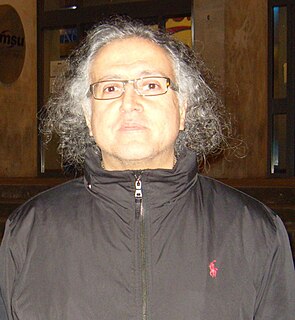 W
WAs'ad AbuKhalil is a Lebanese-American professor of political science at California State University, Stanislaus.
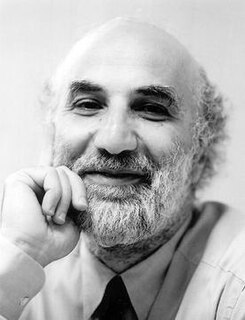 W
WFouad A. Ajami was a MacArthur Fellowship winning, Lebanese-born American university professor and writer on Middle Eastern issues. He was a senior fellow at Stanford University's Hoover Institution.
 W
WAl-Musharaka is a National Institute for Technology in Liberal Education (NITLE) program initiative, intended to expand and enhance the teaching and study of Arab studies, Islamic studies and Middle Eastern studies.
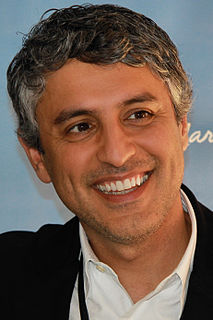 W
WReza Aslan is an Iranian-American scholar of sociology of religion, writer, and television host. A convert to evangelical Christianity from Shia Islam as a youth, Aslan eventually reverted to Islam but continued to write about Christianity. He has written four books on religion: No God but God: The Origins, Evolution, and Future of Islam, Beyond Fundamentalism: Confronting Religious Extremism in the Age of Globalization, Zealot: The Life and Times of Jesus of Nazareth, and God: A Human History.
 W
WThe Association for the Study of Persianate Societies, also known as ASPS, is an academic institution for researchers and scholars interested in the culture and civilization of the Persian-speaking societies and related areas. The association's head office is based in New York. ASPS is one of the partner organisations of Middle East Studies Association of North America.
 W
WMichael A. Barry is a Princeton University professor and historian of the greater Middle East and Islamic world. Since 2004 he has taught as Lecturer in Islamic Culture in Princeton's Department of Near Eastern Studies, in addition to serving as consultative chairman of the Department of Islamic Art at the Metropolitan Museum of Art (2005-2009) and special consultant to the Aga Khan Trust for Culture since 2009. An established authority on Islamic art and the history and culture of Afghanistan, on which subjects he has written extensively in both French and English, Barry's works include a standard French-language history of Afghanistan, a biography of the late commander of the Afghan Northern Alliance, Ahmad Shah Massoud, which won France's Prix Femina in 2002, and an interpretive history of medieval Islamic figurative painting from the 15th to the 16th centuries.
 W
WJoel Beinin is Donald J. McLachlan Professor of History and professor of Middle East history at Stanford University. From 2006 to 2008 he served as director of Middle East studies and professor of history at the American University in Cairo.
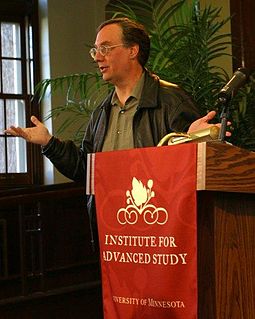 W
WJohn Ricardo Irfan "Juan" Cole is an American academic and commentator on the modern Middle East and South Asia. He is Richard P. Mitchell Collegiate Professor of History at the University of Michigan. Since 2002, he has written a weblog, Informed Comment (juancole.com).
 W
WLawrence Davidson is a retired professor of history from West Chester University in West Chester, Pennsylvania. He is the author of Islamic Fundamentalism, Cultural Genocide and has focused his academic research on American foreign relations with the Middle East.
 W
WJohn Louis Esposito is an Italian-American academic, professor of Middle Eastern and Religious studies, and scholar of Islamic studies, who serves as Professor of Religion, International Affairs, and Islamic Studies at Georgetown University in Washington, D.C.. He is also the founding director of the Prince Alwaleed Center for Muslim–Christian Understanding at Georgetown.
 W
WAndrew Exum is an American scholar of the Middle East, a former U.S. Army officer. He was a part of General Stanley McChrystal's review of the American strategy in Afghanistan.
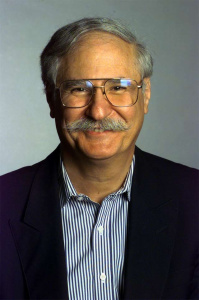 W
WSamih K. Farsoun, was a professor emeritus of sociology at American University, where he taught for thirty years until his retirement in 2003. He graduated from Hamilton College in New York. He received a master's degree in 1961 and a PhD in 1971, both in sociology from the University of Connecticut. He died June 9 of a heart attack while on a walk with his wife in New Buffalo, Michigan. He was a resident of Florida and Washington, D.C. During his career at AU, Farsoun served as chairman of the Department of Sociology for eleven years, chairman and member of numerous university-wide committees. He also established the Arab Studies minor in the Sociology department in 2001.
 W
WDavid Henry Fromkin was an American historian, best known for his interpretive account of the Middle East, A Peace to End All Peace (1989), in which he recounts the role European powers played between 1914 and 1922 in creating the modern Middle East. The book was a finalist for both the National Book Critics Circle Award and the Pulitzer Prize. Fromkin wrote seven books, ending in 2007 with The King and the Cowboy: Theodore Roosevelt and Edward the Seventh, Secret Partners
 W
WThe Hidden Hand: Middle East Fears of Conspiracy is a 1996 book by Daniel Pipes published by St. Martin's Press.
 W
WThe International Journal of Middle East Studies is a scholarly journal published by the Middle East Studies Association of North America (MESA), a learned society.
 W
WThe Jewish Institute for National Security of America (JINSA), formerly named the Jewish Institute for National Security Affairs, is a Washington, D.C.-based, non-profit and pro-Israeli lobby and think-tank. It was founded in 1976 focusing on issues of national security, advocating that Israel can play an important role in bolstering democracy. It claims it has a membership of 20,000.
 W
WMajid Khadduri was an Iraqi–born academic. He was founder of the Paul H. Nitze School of Advanced International Studies Middle East Studies program, a division of Johns Hopkins University based in Washington, D.C. Internationally, he was recognized as a leading authority on a wide variety of Islamic subjects, modern history and the politics of the Middle East. He was the author of more than 35 books in English and Arabic and hundreds of articles.
 W
WRashid Ismail Khalidi is a Palestinian American historian of the Middle East, the Edward Said Professor of Modern Arab Studies at Columbia University, and director of the Middle East Institute of Columbia's School of International and Public Affairs. He also is known for serving as editor of the scholarly journal Journal of Palestine Studies.
 W
WMartin Seth Kramer is an American-Israeli scholar of the Middle East at Shalem College in Jerusalem. His focus is on the history and politics of the Middle East, contemporary Islam, and modern Israel.
 W
WOri Kritz is an Associate Professor and head of the Hebrew Language and Literature program at the University of Oklahoma, a part of the Judaic Studies department. She is a multilingual writer and speaker, specializing in Yiddish, Hebrew, and Jewish literature and in Jewish and Israeli humor.
 W
WBernard Lewis, was a British American historian specialized in Oriental studies. He was also known as a public intellectual and political commentator. Lewis was the Cleveland E. Dodge Professor Emeritus of Near Eastern Studies at Princeton University. Lewis's expertise was in the history of Islam and the interaction between Islam and the West.
 W
WJoseph Andoni Massad is Professor of Modern Arab Politics and Intellectual History in the Department of Middle Eastern, South Asian, and African Studies at Columbia University. His academic work has focused on Palestinian, Jordanian, and Israeli nationalism.
 W
WJane Dammen McAuliffe is a prominent American educator, scholar of Islam and the inaugural Director of National and International Outreach at the Library of Congress. She is a President Emeritus of Bryn Mawr College and former Dean of Georgetown College at Georgetown University. As a specialist in the Qur'an and its interpretation, McAuliffe has edited the six-volume Encyclopaedia of the Qurʾān and continues to lead the editorial team for the online edition of the work. She held previous appointments at Emory University as professor and associate dean and at the University of Toronto as Chair of the Department for the Study of Religion and Professor of Islamic Studies in the Department of Near and Middle Eastern Civilizations. She received her BA in Philosophy and Classics from Trinity Washington University and her MA in religious studies and PhD in Islamic studies from the University of Toronto.
 W
WMohammed Taki Mehdi, commonly M. T. Mehdi was an Arab-American based in New York and one of the earliest pro-Palestinian activists in the United States, and often brash in his defense of the Palestinian cause. He held debates on television and radio with many supporters of Israel, including the rabbi Meir Kahane. He died of cardiac arrest at Bellevue Hospital in 1998.
 W
WThe Middle East Institute (MEI) is a non-profit, non-partisan think tank and cultural center in Washington, D.C., founded in 1946. It seeks to "increase knowledge of the Middle East among the United States citizens and promote a better understanding between the people of these two areas."
 W
WThe Middle East Journal is a quarterly peer-reviewed academic journal published by the Middle East Institute. It was established in 1947 and covers research on the modern Middle East, including political, economic, and social developments and historical events in North Africa, the Middle East, Caucasus, and Central Asia. Jacob Passel is the current editor.
 W
WDaniel Pipes is an American historian, writer, and commentator. He is the president of the Middle East Forum, and publisher of its Middle East Quarterly journal. His writing focuses on American foreign policy and the Middle East.
 W
WWilliam B. Quandt is an American scholar, author, professor emeritus in the Department of Politics at the University of Virginia. He previously served as senior fellow in the Foreign Policy Studies Program at the Brookings Institution and as a member on the National Security Council in the Richard Nixon and Jimmy Carter administrations. He was actively involved in the negotiations that led to the Camp David Accords and the Egypt–Israel Peace Treaty. His areas of expertise include Algeria, Egypt, Israel, Palestine, the Israeli–Palestinian peace process, and U.S. foreign policy.
 W
WRosemarie Said Zahlan was a Palestinian-American Christian historian and writer on the Arabian Gulf states. She was a sister of Edward Said. In addition to her books, she also wrote for the Financial Times, the Middle East Journal, the International Journal of Middle East Studies and the Encyclopedia of Islam.
 W
WEdward Wadie Said was a professor of literature at Columbia University, a public intellectual, and a founder of the academic field of postcolonial studies. A Palestinian American born in Mandatory Palestine, he was a citizen of the United States by way of his father, a U.S. Army veteran.
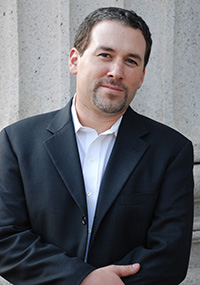 W
WJonathan Schanzer is an American author and senior vice president of research at the Foundation for Defense of Democracies. He oversees the work of the organization's experts and scholars.
 W
WThe Sharmin and Bijan Mossavar-Rahmani Center for Iran and Persian Gulf Studies is a study center department at Princeton University. Its aim is to support teaching and research of Iran and Persian Gulf studies and to create and support productive and innovative connections across departments throughout the University.
 W
WStanford Jay Shaw was an American historian, best known for his works on the late Ottoman Empire, Turkish Jews, and the early Turkish Republic. Shaw's works have been criticized for their lack of factual accuracy as well as denial of the Armenian genocide, and other pro-Turkish bias.
 W
WDenise A. Spellberg is an American scholar of Islamic history. She is professor of history and Middle Eastern Studies at the University of Texas at Austin. Spellberg holds an A.B. in History from Smith College (1980) and an M.A., M. Phil., and a PhD (1989) in Middle Eastern History from Columbia University.
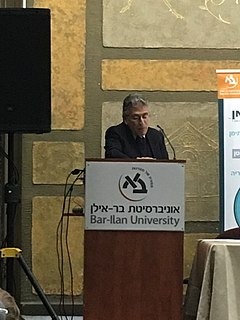 W
WNorman Arthur Stillman, also Noam, b. 1945, is an American academic, historian, and Orientalist, serving as the emeritus Schusterman-Josey Professor and emeritus Chair of Judaic History at the University of Oklahoma. He specializes in the intersection of Jewish and Islamic culture and history, and in Oriental and Sephardi Jewry, with special interest in the Jewish communities in North Africa. His major publications are The Jews of Arab Lands: a History And Source Book and Sephardi Religious Responses to Modernity. In the last few years, Stillman has been the executive editor of the "Encyclopedia of Jews in the Islamic World", a project that includes over 2000 entries in 5 volumes.
 W
WThe Fares Center for Eastern Mediterranean Studies is an interdisciplinary education and research organization founded in 2001, devoted to the regional study of the Eastern Mediterranean within the greater Middle East. The Center is part of The Fletcher School of Law and Diplomacy, at Tufts University. Its aim is the study and understanding the heritage of the Eastern Mediterranean and the challenges it faces in the twenty-first century, being at the crossroads between the academic and policy world.
 W
WBassam Tibi, is a German political scientist and Professor of International Relations. He was born in 1944 in Damascus, Syria to an aristocratic family, and moved to Germany in 1962 where he later became a citizen in 1976. He is known for his analysis of international relations and the introduction of Islam to the study of international conflict and of civilization. Tibi is known for introducing the controversial concept of European Leitkultur as well as the concept of Euroislam to discussions about integration of Muslim immigrants to countries in Europe. He is also the founder of Islamology as a social-scientific study of Islam and conflict in post-bipolar politics. Tibi has done research in Asian and African countries. He publishes in English, German and Arabic.
 W
WThe Washington Report on Middle East Affairs magazine, published eight times per year, focuses on "news and analysis from and about the Middle East and U.S. policy in that region". The New York Times has characterized it as "critical of United States policies in the Middle East". In 2005, USA Today called it "a non-partisan publication that has been critical of Bush's policies". Representatives of pro-Israel organizations have criticized the Washington Report on Middle East Affairs as being aligned with the Arab lobby and as "anti-Israel".